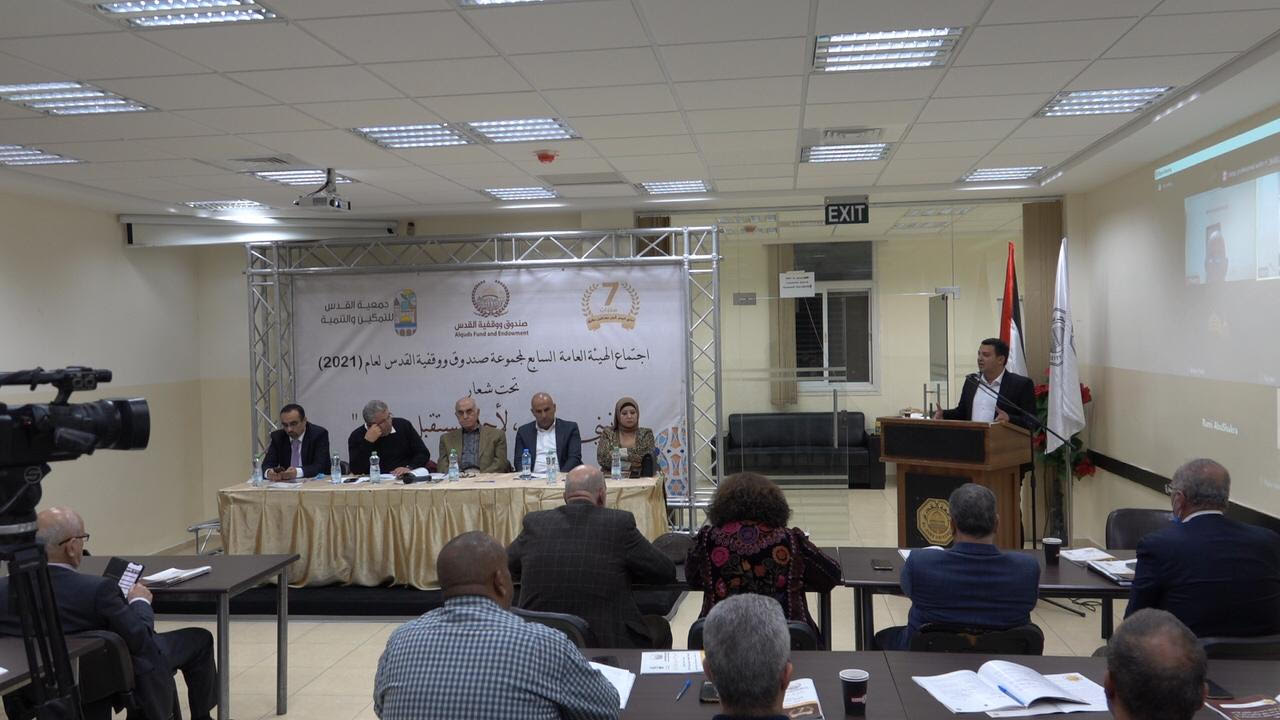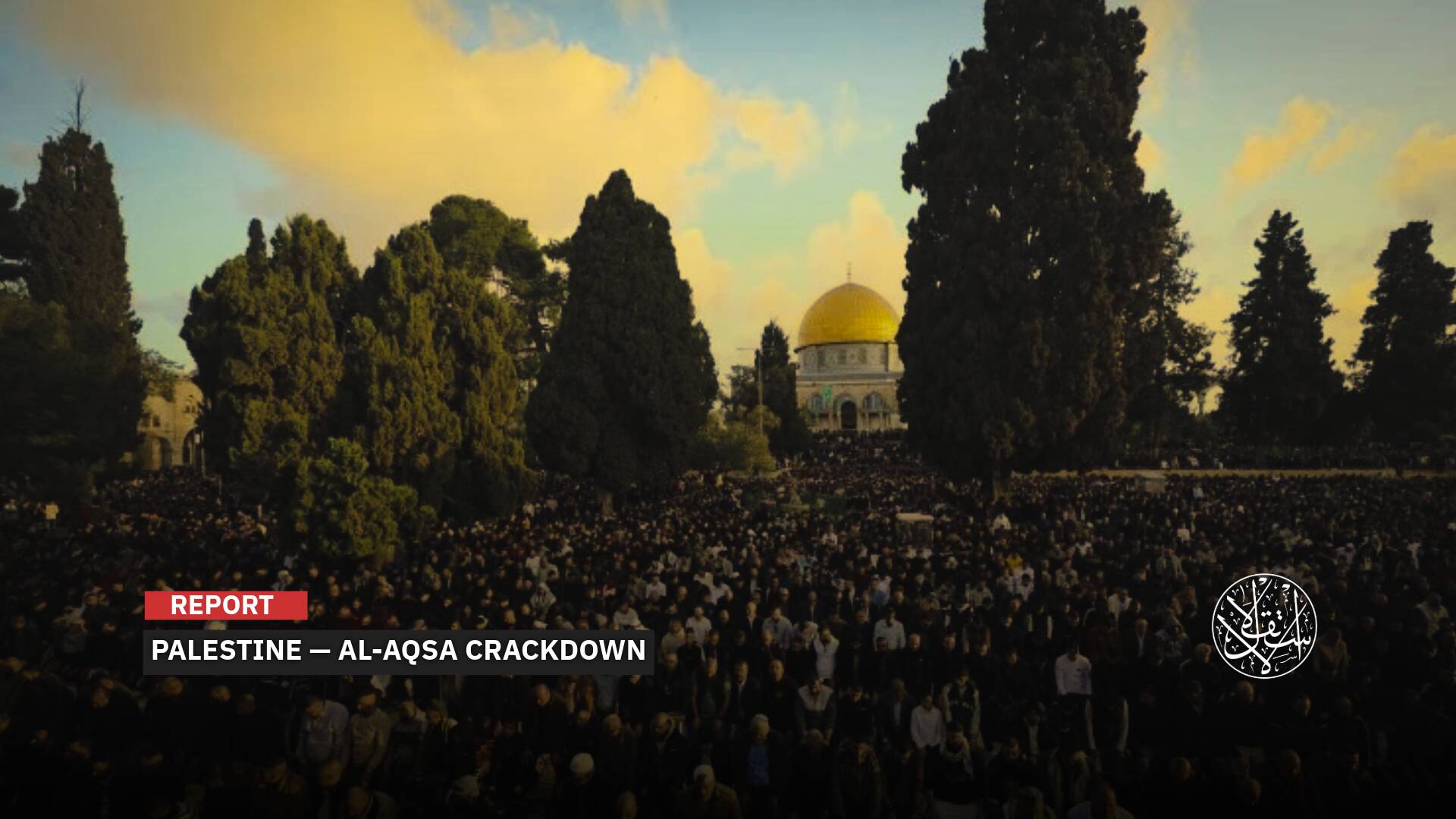Erasing Identity, Cementing Displacement: Why Did ‘Israel’ Shut Down Alquds Fund?

“We will stay on our land as long as there is thyme and olives.”
As settlement plans intensify in East Jerusalem—occupied by “Israel” since 2014—and as Israeli authorities refuse to renovate Palestinian homes and heritage sites, allowing them to deteriorate, while foreign purchases of land for Zionist interests increase, residents of the city decided to establish the Alquds Fund and Endowment to support their community.
Alquds Fund and Endowment describes itself as “an independent, non-profit institution founded to strengthen the resilience of the Palestinian people in occupied Jerusalem and to promote development in the city.”
To break that resilience, symbolized by the Fund’s motto, “We will stay on our land as long as there is thyme and olives,” Israeli authorities, now advancing aggressive settlement policies led by far-right ministers Itamar Ben-Gvir and Bezalel Smotrich, targeted the institution.
On April 28, 2025, the occupied Jerusalem Governorate announced that Israeli National Security Minister, Ben-Gvir, had ordered the closure of the Alquds Fund’s offices in occupied East Jerusalem.
Israeli Occupation forces raided the organization’s premises and delivered an official notice of closure for six months, subject to extension. The justification was that the Fund operates on behalf of the Palestinian Authority; yet the true motive is to dismantle Palestinian presence and accelerate forced displacement.
These developments come alongside Israeli Prime Minister Benjamin Netanyahu’s decision to escalate the war in Gaza, including the mobilization of thousands of reserve troops.
With U.S. support, “Israel” has, since October 7, 2023, carried out “acts of genocide” in Gaza, leaving over 170,000 Palestinian civilians killed or wounded, mostly women and children, and more than 11,000 missing, amid widespread destruction.
The Story of the Fund
Alquds Fund and Endowment is an independent, non-profit organization established in 2014 to serve civil society in the occupied city of Jerusalem. It operates across several humanitarian fields, including home restoration in the Old City, education support, and women’s empowerment.
The Fund was launched as an initiative by Palestinian business leaders to reinforce the resilience of occupied Jerusalem and its people, and to counter efforts to displace them and seize or pressure them into selling their land.
Prominent businessman Munib al-Masri serves as Chairman of the Fund’s Board of Directors.
The board includes key figures such as Palestine Investment Fund founder Zahi Khouri, former al-Quds University President Imad Abu Kishek, and businessmen Michael Sayegh, Walid al-Ahmad, and Majdi Zaghir.
Prince Turki al-Faisal, former head of Saudi intelligence, holds the honorary chairmanship of the Fund’s Board of Trustees and regularly meets with Chairman Munib al-Masri to follow up on the Fund’s work.
Although “Israel” has long abandoned the Oslo Accords and similar agreements, and has even signaled intentions to annul them, Israeli Minister Itamar Ben-Gvir used the 1994 activities restriction law, which regulates Palestinian Authority activities, as the legal basis to shut down Alquds Fund and Endowment.
The law was introduced under the now-defunct “Gaza–Jericho Agreement,” which aimed to prevent the Palestinian Authority from conducting political, diplomatic, or security-related activities—such as opening representative offices—especially within areas like occupied Jerusalem, which were excluded from the PA’s jurisdiction.
Despite the fact that there is no affiliation or coordination between Alquds Fund and the Palestinian Authority, Israeli authorities used this expired law to justify the closure of the Fund’s office in occupied Jerusalem, seeking legal cover for a politically motivated decision.
On February 19, 2025, the Israeli Knesset’s General Assembly approved in a preliminary reading a draft law further restricting the activities of the Palestinian Authority, the Palestine Liberation Organization (PLO), and the Fatah movement in areas under what “Israel” claims as its “sovereignty.”
This primarily targets occupied East Jerusalem and its surrounding towns and refugee camps, which have remained under Israeli occupation since 1967.
The closure of the Fund comes amid broader Israeli efforts to Judaize occupied Jerusalem, including extensive excavation work, archaeological digs, and the construction of synagogues around al-Aqsa Mosque compound.
One of the latest projects is the completion of a new elevator system that enables settlers to reach the Buraq Wall (Western Wall) and access the courtyards of al-Aqsa in large numbers—part of a larger plan to alter the city’s Islamic character and impose a new reality on the ground.
Since 2001, “Israel” has shut down more than 40 Palestinian institutions in occupied Jerusalem, including Orient House, the Union of Chambers of Commerce, the Arab Chamber of Commerce and Industry, the Palestinian Prisoner Club, the Arab Studies Society Library, and the Higher Council for the Palestinian Tourism Industry .
Other closures have targeted institutions like the Palestinian Broadcasting Corporation and many more, as part of a broader policy aimed at stripping Jerusalemites of access to essential social, economic, and cultural services—while also undermining Palestinian national and political institutions.
The shutdown of Palestinian organizations in occupied Jerusalem adds to a series of violations that include land confiscation, settlement expansion, home demolitions, and ID revocations.
These actions are reinforced by military checkpoints, the separation wall, and discriminatory expansion policies that isolate the city from its Palestinian surroundings, all part of Israeli Occupation’s systematic campaign to Judaize occupied Jerusalem, displace its native population, and impose annexation.

Zionist Objectives
Dr. Abdallah Marouf, professor of Jerusalem Studies and former head of public relations at al-Aqsa Mosque, told Al-Estiklal that the closure of Alquds Fund is part of Israeli Occupation’s broader efforts to eliminate all Palestinian presence in the city.
“Shutting down Alquds Fund is part of the Israeli Occupation’s measures to tighten its grip on the Holy City and expel all Palestinians, regardless of their affiliations.”
He noted that Palestinian institutions in Jerusalem represent the people’s presence in the city, and from the Israeli perspective, erasing that presence requires dismantling any institution that symbolizes Palestinian identity.
“This attack on the Endowment was expected,” Marouf said, “as it forms part of a long-standing strategy by the Israeli Occupation to gradually nibble away at Jerusalem.”
The move is also tied to far-right minister Itamar Ben-Gvir’s ambitions to portray himself as the ultimate authority in occupied Jerusalem, using such decisions to claim “achievements” in the eyes of his extremist base.
“Israel does not distinguish between Palestinian institutions when it comes to Jerusalem,” he added.
Several occupied Jerusalem-based organizations echoed this view, stating that Ben-Gvir’s hostile move aimed to dry up the sources of institutional support for Jerusalemites, accelerating their displacement from the city, according to the Quds Governorate’s statement.
Imad Abu Kishek, a member of Alquds Fund’s board of trustees, told the Palestinian News and Information Agency WAFA on April 29 that the foundation represented hope for Jerusalemites by supporting institutions, empowering individuals, and restoring homes.
He emphasized that the Endowment is independent and non-political, originally founded by Palestinian businesspeople and later joined by Arab investors to support Jerusalemites and their funding needs.
“The Endowment’s donors and administrators contribute from their own personal wealth,” he said. “This closure is part of a campaign to dismantle Palestinian civil society in Jerusalem.”
He stressed that Ben-Gvir’s move reflects a broader policy of pressuring and shutting down Jerusalem-based institutions, particularly those involved in relief and empowerment, adding that this policy contradicts international norms and laws.
Media Advisor to the Governor of occupied Jerusalem Ma'rouf Al-Rifa’i said the ongoing crackdown on institutions in the city aims to isolate Al-Quds (occupied Jerusalem) from its Arab surroundings and assert exclusive Israeli control.
He questioned the rationale behind shutting down an apolitical and independent institution like Alquds Fund, which primarily provides support to the city's residents.
Al-Rifa’i noted that “Israel” is targeting key Palestinian figures in occupied Jerusalem, including the governor and ministers. “Even libraries haven't been spared. It began with the closure of Orient House, the PLO’s symbolic institution in the city,” he said.
These efforts are part of Israeli Occupation’s “Jerusalem 2050” plan, which seeks to increase the city’s Jewish population to 5 million while reducing the Arab population to under 10%. Targeting Palestinian institutions, he added, fits squarely within that strategy.
The Quds Governorate condemned the raid on the Endowment’s offices and the delivery of closure orders under the pretext that the institution operates on behalf of the Palestinian Authority.
In a statement issued on April 29, the Governorate said the decision is part of a systematic campaign by the Israeli Occupation government to dismantle Palestinian civil society, seize every form of support available to Jerusalemites, and undermine their economic and social resilience.
It described the decision as “a hostile move that falls within the Israeli Occupation’s strategy to undermine Palestinian presence in the occupied Jerusalem.”
The statement further noted that Ben-Gvir’s decision, which was a political crime committed by a figure known for his extremism and racism, underscores the Israeli Occupation’s unprecedented escalation to stifle Palestinian life in occupied Jerusalem and break the resilience of its people.
“This is part of an open war targeting Palestinian institutions in Jerusalem—institutions that serve as a critical line of defense in the fight to remain and endure in the city.”
The Governorate dismissed Israeli Occupation’s justification that the Endowment operates on behalf of the Palestinian Authority, calling it “completely false and baseless.”
“The Jerusalem Endowment operates solely in humanitarian, charitable, and social work. It has no political role. Its mission is to support the resilience of our people in Jerusalem,” the statement read, “to enable them to live in dignity amid daily violations and pressures imposed by the occupation.”
Israeli Occupation authorities are currently prosecuting the Governor of the Quds Governorate, Adnan Ghaith. His trial has been postponed until September 2025, while he remains under strict restrictions, including house arrest, a ban on entering the West Bank, and a prohibition on communicating with Palestinian figures.
Majdi Zaghir, a member of Alquds Fund, stated that the fund is an independent institution serving civil society in occupied Jerusalem and provides purely humanitarian services. He described the closure decision as unjust and a violation of international law.
He added that Alquds Fund and Endowment aims to foster development across various sectors to preserve the city’s national identity and strengthen Palestinian resilience—efforts the Israeli Occupation seeks to obstruct.
Following the decision to shut down and ban Alquds Fund, the Chairman of its Board of Directors, Munib al-Masri, declared that Ben-Gvir’s decision is illegitimate and unlawful. He affirmed that such restrictions will not deter the fund from fulfilling its national and humanitarian duties.
Al-Masri vowed that, despite all obstacles, the institution will press on, delivering vital and lasting projects to uphold occupied Jerusalem’s identity and preserve the dignity of its people.

Hundreds of Beneficiaries Will Be Affected
Jerusalemites say Ben-Gvir’s move to shut down Alquds Fund and ban its work in the city is meant to tighten the noose around them, leaving them to face the occupation, settlement expansion, and the Judaization of Jerusalem alone, deepening their hardship.
Al-Rifa’i, confirmed that the decision will negatively impact Jerusalemite students, women’s charitable organizations, small home-based businesses, and the families of detainees and martyrs who have lost their main providers.
Speaking to the press in occupied Jerusalem, he stated that the decision reflects the Israeli Occupation’s aim to drive residents out of the city, warning that it may lead to the expulsion of institutions that support the resilience of Jerusalemites and the drying up of all sources of support for them.
He explained that the institution serves university students through grants, loans, and financial aid, as well as women’s associations and grassroots initiatives that strengthen Palestinian steadfastness in occupied Jerusalem.
As such, the closure will harm those who previously received assistance from the fund. Loans and small-scale projects for the families of detainees, martyrs, and needy households will be disrupted.
Al-Masri echoed the same concern, stating that closing the fund's offices will negatively affect hundreds of beneficiaries, especially university students who rely on its scholarships.
He also noted that “citizens who receive funding for small businesses, families whose uninhabitable homes are being renovated, and schools undergoing restoration” will all be harmed.
Among the most critical targeted projects are historic Palestinian homes in occupied Jerusalem. The ban on the Endowment will prevent their restoration, undermining their resilience.
As an example, the fund’s media coordinator, Momen Shabaneh, confirmed that between 2017 and 2021, the Endowment program contributed $1.9 million to restore over 25 homes in occupied Jerusalem and rehabilitate the northern section of Bab al-Rahma Cemetery, according to the local Wattan News Agency.
Al-Masri emphasized that all of these vital services will now be halted, causing significant harm to a wide segment of occupied Jerusalem’s population.
“The real motives behind the Israeli Occupation’s decision to close the institution are rooted in its broader policy in [occupied] Jerusalem, which seeks to restrict the presence of civil society organizations and undermine all efforts that empower Palestinians economically and socially.”
Sources
- On Ben-Gvir's orders: The Israeli Occupation Bans the Alquds Fund [Arabic]
- In a Dangerous Move, Ben-Gvir Targets Jerusalem Institutions and Shuts Down Alquds Fund and Endowment' [Arabic]
- Targeting Alquds: A Bid to Tighten the Noose on Palestinians and Judaize the City [Arabic]
- Alquds Fund: Remarkable Efforts in Rebuilding the City and Strengthening Its People [Arabic]













